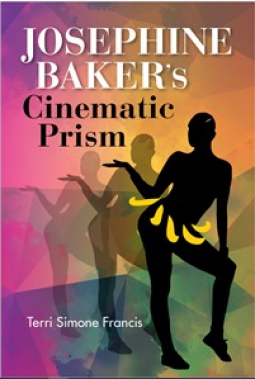
Josephine Baker's Cinematic Prism
by Terri Simone Francis
This title was previously available on NetGalley and is now archived.
Send NetGalley books directly to your Kindle or Kindle app
1
To read on a Kindle or Kindle app, please add kindle@netgalley.com as an approved email address to receive files in your Amazon account. Click here for step-by-step instructions.
2
Also find your Kindle email address within your Amazon account, and enter it here.
Pub Date Jan 19 2021 | Archive Date Mar 31 2021
Darcie Rowan PR | Indiana University Press
Talking about this book? Use #JosephineBakersCinematicPrism #NetGalley. More hashtag tips!
Description
An Awe-Inspiring Black History Month Read!
An American History Story Perfect for Women's History Month
Josephine Baker, the first Black woman to star in a major motion picture, was both liberated and delightfully undignified, playfully vacillating between allure and colonialist stereotyping.
Nicknamed the "Black Venus," "Black Pearl," and "Creole Goddess," Baker blended the sensual and the comedic when taking 1920s Europe by storm.
Back home in the United States, Baker's film career brought hope to the Black press that a new cinema centered on Black glamour would come to fruition.
In Josephine Baker's Cinematic Prism, Terri Simone Francis examines how Baker fashioned her celebrity through cinematic reflexivity, an authorial strategy in which she placed herself, her persona, and her character into visual dialogue. Francis contends that though Baker was an African American actress who lived and worked in France exclusively with a white film company, white costars, white writers, and white directors, she holds monumental significance for African American cinema as the first truly global Black woman film star. Francis also examines the double-talk between Baker and her characters in Le Pompier de Folies Bergère, La Sirène des Tropiques, Zou Zou, Princesse Tam Tam, and The French Way, whose narratives seem to undermine the very stardom they offered. In doing so, Francis artfully illuminates the most resonant links between emergent African American cinephilia, the diverse opinions of Baker in the popular press, and African Americans' broader aspirations for progress toward racial equality.
Examining an unexplored aspect of Baker's career, Josephine Baker's Cinematic Prism deepens the ongoing conversation about race, gender, and performance in the African diaspora.
Terri Francis teaches film studies courses and directs the Black Film Center/Archive at Indiana University. A scholar of Black film and critical race theory, her work involves archival research, cultural history and visual analysis, set within the vicissitudes of performance and representation. Her essays appear in in Film History, Transition, Black Camera, and Another Gaze.
Advance Praise
Josephine Baker's Cinematic Prism explores Baker's films with unprecedented attention to details of production, reception, and Baker's performances and screen aspirations. Terri Francis does not choose sides, or situate Baker in an irresolvable tension between exploited exotic and self-determined artist. Instead, Francis reads Baker's cinematic work as the most significant, dynamic expression of her multifaceted aesthetic, in which she continually refracted imaginaries of race and gender, colonialism and Black success, through her screen labor and image.
-- Jacqueline Stewart, Migrating to the Movies: Cinema and Black Urban Modernity
Marketing Plan
International and National Publicity Campaign
Podcast Interviews
Radio Interviews
Black History Month promotions
Digital and Print interviews
International and National Publicity Campaign
Podcast Interviews
Radio Interviews
Black History Month promotions
Digital and Print interviews
Available Editions
| EDITION | Other Format |
| ISBN | 9780253223388 |
| PRICE | $24.00 (USD) |
| PAGES | 216 |
Average rating from 8 members
Featured Reviews
 Kendahl C, Reviewer
Kendahl C, Reviewer
Josephine Baker was an anomaly in the early days of black representation in cinema. She never played a maid or a cook and she was always the star of her films. As the energetic star of films including Zouzou (1934), Siren of the Tropics (1927), and Princesse Tam-Tam (1935), she offered a new perspective on Black actresses on the screen. That said, the way she was presented to her public had its complications. In a new book, Terri Simone Francis explores the legendary performer’s image and accomplishments on the screen.
Before I picked up this book, I’d never watched a Josephine Baker film. I’m not sure why. I’ve enjoyed clips of her singing and dancing, I’ve read two biographies about her, I’ve even read a whole book about her Rainbow Tribe of adoptees from around the world. The only conclusion I can come to is that I assumed that a woman who walked down the streets of Paris with a Cheetah on a leash, had men fighting duals over her, and lived in glamour and chaos for decades could never be half as amusing in a film as she was in real life.
I’m glad this book inspired me to fill in that hole in my cinematic education. I’m also happy to have been wrong, because while Baker didn’t think much of her films, she had presence and the camera loved her. This academic, but accessible deep dive into her film career and the impact of her image in the movies is thorough in considering what influenced her, how she reflected the current culture, and how she continues to be an influence today.
Francis explores how Baker’s performance style was inspired by African dance and blues singers like Ethel Waters, Ma Rainey, and Clara Smith (with whom she performed in the US). She put her own comic lens on these varied influences and presented her take with a boldness that would later show in the style of top stars like Diana Ross and Beyoncé. That vibrancy would translate well to the screen, where her mere presence was invigorating in addition to her energetic, unique dance style and solid comic chops.
Baker’s films were intricate in the way they approached her role in society. While she was the glamorous and charismatic focus of attention, there was always a flavor of exoticism in the way she was portrayed. French colonialism also had a steady pull, keeping her centered, but not quite free. Wealthy white men might have found her alluring, but she was never the romantic focus. Francis thoughtfully details that uneasy balance of stardom and restriction that affected her film work, placing Baker in the complicated history of minstrelsy, Hottentot Venus, and other modes of Black performance and spectacle.
This is an impressively thorough examination of a relatively short period of Baker’s career that nevertheless had a significant impact on her image and legacy.
Readers who liked this book also liked:
Mary Annaïse Heglar
General Fiction (Adult), Multicultural Interest, Women's Fiction








